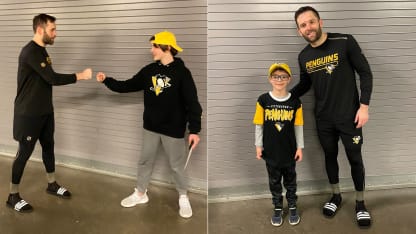Editor’s Note: The King Clancy Memorial Trophy is presented annually to the NHL player who best exemplifies leadership qualities on and off the ice and has made a noteworthy humanitarian contribution in his community. Each NHL Club nominates a player to be considered for this recognition, and each nominee has a unique and powerful connection to his community efforts. Today, the Pittsburgh Penguins nominee for the 2023-24 season -- Bryan Rust -- shares his story.
Media scrums are part of life in the NHL. We talk about our play, our teammates, and our expectations as a group. Often, we can guess which questions are coming. Sometimes we’re surprised by a few topics.
But after every interview, when the microphones and cameras go away, I exhale a bit. And there’s a quick thought in my head: You did well.
It’s not about how I responded to the questions. It’s about the fact that I was able to respond and speak fluently -- because I remember the days when that wasn’t always true, based on my experience with stuttering.
Growing up, I put a lot of time and energy into improving my speech. I’d go to speech therapy with my older brother, Matt, who also stuttered. In the beginning, there were sessions where I’d talk perfectly, and the speech therapist would tell my parents that I might not need help after all. But then there were days where I really struggled, and my language would be all over the place.
Stuttering can vary like that -- because different circumstances can affect your ability to focus on speaking fluently. Over time, you learn what works for you and how you can concentrate on getting your words out. But you also learn that it’s never going to be perfect. You are going to make mistakes. And it can be challenging to navigate that reality without feeling some anxiety.
During my college hockey career, I can vividly remember the feeling of my heart racing when I stood in front of cameras. I’d get really nervous and then speak too quickly, trying to rush through it … which only made my speech worse. There are clips from some of my Notre Dame interviews that I won't go back and watch because I can tell how uncomfortable I was.
I was putting too much pressure on myself, when the best thing for me would’ve been dealing with the situation head-on. Acknowledging my stuttering and working on it has helped me learn to relax and find my voice, whether I’m in group settings or having one-on-one conversations.
Some of my favorite conversations these days are with kids from the National Association of Young People who Stutter, commonly known as Friends Who Stutter. Through my “Seats for Strength” initiative, I invite children with speech impediments and their families to be my guests at Penguins home games. I really look forward to spending time with them after each game and hopefully giving them a little motivation to keep going.




















